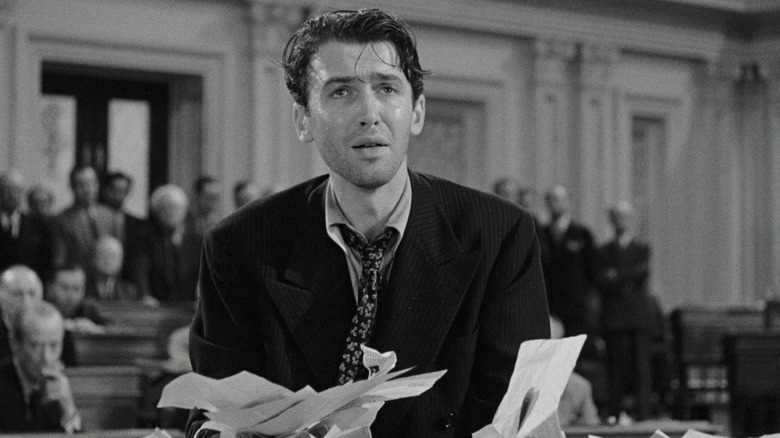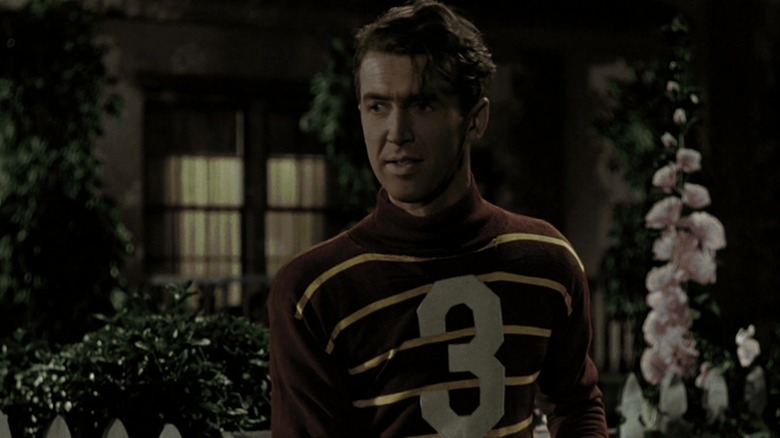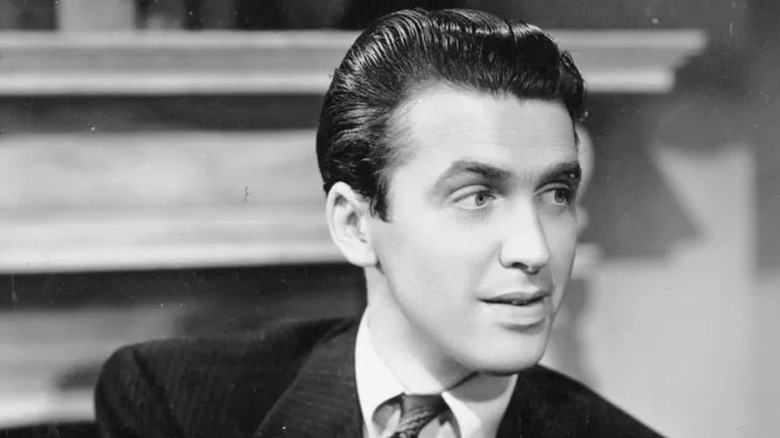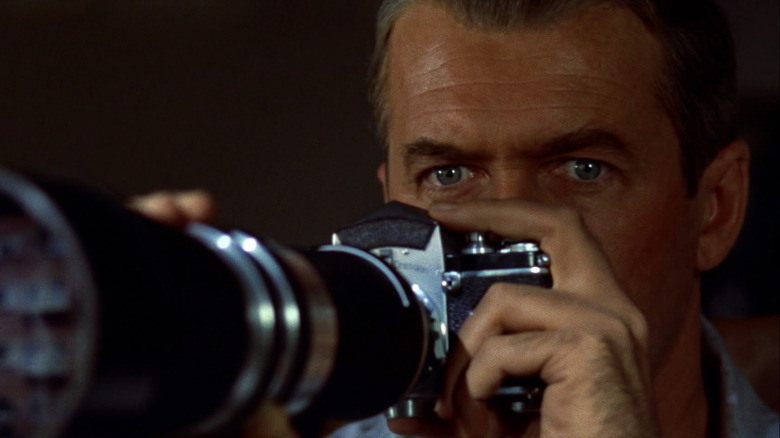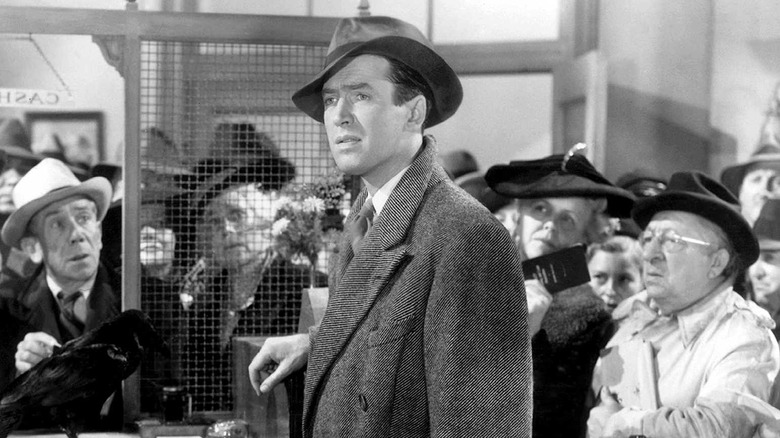How Jimmy Stewart Found His Signature Acting Style
When America looks in the mirror, it sees honor, respectability, and loyalty, and it saw the same qualities when it looked at Jimmy Stewart.
Stewart was one of the first Hollywood stars to possess the everyman quality seen in actors like Tom Hanks today. On-screen, the characters of George Bailey or John "Scottie" Ferguson are larger than life, but the drawl and endearing smile made the Hollywood star portraying them relatable. Audiences felt like James Stewart, who they liked to call Jimmy, was the kind of guy they could invite over for breakfast. He was an average joe who just happened to stutter his way into stardom.
Stewart is considered one of America's greatest actors, appearing in classics like "Vertigo" and "It's a Wonderful Life." On the surface, he didn't look or perform like a typical Hollywood star. He was lanky and awkward, two things no one associates with the golden age of Hollywood, but he embraced these qualities and became one of the biggest stars of that era.
Stewart is known for playing an average guy who stumbles onto something bad and bravely stands up against it. Just before World War II, he had already found success with these kinds of characters. His tendency toward the everyman who becomes the hero fused with Stewart's real-life actions, which meant he was often accused of playing himself. Surprisingly, he embraced this accusation, saying, "I am James Stewart playing James Stewart. I couldn't mess around doing great characterization. I play variations of myself."
History remembers him as the moral compass of his films, the guy we can always count on to do the right thing, but the reality of who he was is more complicated.
The typical Stewart
Some of Stewart's most popular movies were made before WWII. These include "Mr. Smith Goes to Washington," "The Shop Around the Corner," and "The Philadelphia Story," which all featured the typical role he used to play. He was the gentle man the heroine fell in love with and the idealistic senator who arrived in Washington to stand up against corruption.
It didn't take long for audiences and critics to paint him as the all-American hero, and Stewart let it stick. The Academy picked up on his talent, and he was nominated for best actor in 1940 for "Mr. Smith Goes to Washington," but he lost to Robert Donat. The next year, he was nominated again for "The Philadelphia Story," along with Charlie Chaplin, Henry Fonda, Laurence Olivier, and Raymond Massey.
Stewart won.
With competition like that, he also won some pretty sweet bragging rights, but Stewart would never be so rude.
Like pre-WWII audiences, I love Stewart in these earlier movies. Few actors can make me believe a moral speech or banter with a leading lady the way he can. The most loveable thing about Stewart is he never goes too far in these roles. He's charming, but a little too awkward to be cocky, and willing to fight for what's right without sacrificing his tenderness. I really can't blame audiences for falling in love with a guy like that.
The aw-shucks persona
When asked to analyze the type of character he often played, in his classic drawl, Stewart explained:
"I am the plotter. I'm the inarticulate man that tries. I'm a pretty good example of true human frailty. I don't really have all the answers. I have very few of the answers but, for some reason, somehow I make it. I get through. I'm the head of the wagon train that, for some reason, would get across the rock."
Stewart claims, before this interview, he hadn't put a lot of thought into the qualities of his characters. I don't know about you, but I don't buy that he came up with that answer on the spot. Would an inarticulate person even use the word "inarticulate"? My 8-ball says it's doubtful. Stewart knew exactly the kind of character he played, and he did it on and off-screen.
A long-time friend and fellow actor, George Kennedy, spoke about Stewart in a Turner Classic Movie feature where he revealed Stewart's little secret, saying: "[he] learned early on that [the stutter and drawl] worked. That's what they wanted ... because he represent[ed] what America would like to think of itself as being."
In other words, Jimmy Stewart did spend his life playing Jimmy Stewart, but it wasn't the real him. The awkward, slow-talking, boy next door seen in interviews is just another character he played, the one America wanted to believe was real. This belief became even stronger when Stewart threw away the Hollywood glamour to join the army.
During a time when Americans' eyes and minds were full of horrifying images of concentration camps and death, Stewart stopped portraying Hollywood heroes on-screen and became one. It's almost poetic, the Hollywood underdog with an everyman charm marching off to fight the Nazis. But the war changed Stewart and his characters. The only thing that remains stable after the war is how well he pulls off that relatable average man persona, and it works so well, I even sympathize with his darker characters.
And, in case you're confused, yeah, Jimmy Stewart played bad guys.
The shadier side of Stewart
Stewart's post-war roles are his most-known and celebrated, but a lot of people overlook the fact that these characters are not good guys. In fact, some of them are downright shady.
In "Winchester '73," he's a cowboy out for revenge, hunting his own brother for the murder of their father. He's violent, blinded by vengeance, but he still manages to convince us he's not all that bad. After all, the brother is a murderer, so he deserves what happens to him, right?
When he is accused of liking the hunt, Stewart assures us that isn't the case, "I don't like it. Some things a man has to do, so he does them." My soul cheers when Stewart avenges his father by killing his brother, but why? Because no matter what the all-American Stewart does, he finds a way to tug us over to his side. I dare you to watch this scene and tell me that, somewhere deep down in your belly, you don't root for ol' Jimmy. I bet you can't.
Stewart occupied these Western roles for a while, playing the same disillusioned cowboy that liked to hang out in morally grey territory. Then, he moved on to Hitchcock films.
In "Rear Window," he's a voyeuristic photographer who thinks he's watching a woman being physically assaulted, but he does nothing. Yeah, his character is stuck in his room with a broken leg, and this was years before 911 was invented, but Stewart doesn't yell out of the open window, try to throw something through it, he doesn't even try to phone someone for help. As the woman is thrown around the room by a man three times her size, he stammers and asks his nurse, "What do we do?" in that endearing drawl. You watch his baby blue eyes jump around with concern and anxiety, and somehow you feel sorry for him. Poor Jimmy, you think, he wants to help her so badly.
'I prefer you, too'
When I watch Stewart hunting down his own flesh and blood in "Winchester '73," or spying on the woman next door in "Rear Window," I automatically want to make excuses for him, which is exactly why he didn't push back against the idea that he was playing himself. If we believe Jimmy Stewart is always Jimmy Stewart, the actions of his characters blend with the persona he showed the world, and this typical guy becomes what everyone wishes they could be. He's the actor who gave up fame and fortune to march off to war, but he's also the man who offered to lasso the moon for a woman he loved, and punched John Wayne in the face for being a bully.
I have no doubt that the real Jimmy Stewart was a brave, talented, and honorable man. I can't argue against his military record or the fact that his wife of 45 years said he "never once gave [her] cause for anxiety or jealousy," but he was also incredibly intelligent. He made audiences fall in love with his characters on-screen, but he knew the role he had to play off-screen, too, and it's one of America's favorites.
